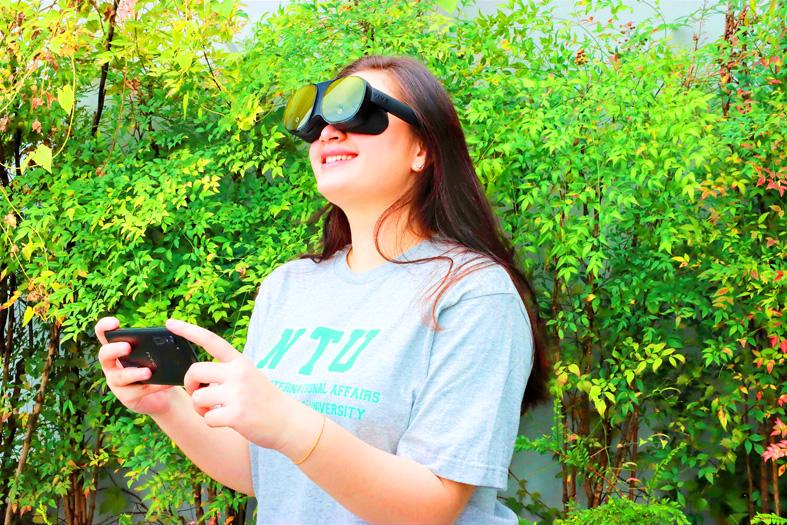Smartphone maker HTC Corp (宏達電) has reported another quarterly net loss in the third quarter of the year, although its gross margin continued to improve.
In a statement on Tuesday, HTC said that it reported a net loss of NT$770 million (US$27.63 million) in the July-to-September period, higher than the NT$550 million net loss a quarter earlier.
Hurt by its struggling smartphone business, HTC has run a net loss every quarter since the second quarter of 2015, except for the first quarter of 2018, when an asset sale helped it post a quarterly net profit.

Photo courtesy of HTC Corp via CNA
Its losses per share in the third quarter rose for the first time in five quarters to NT$0.94, from NT$0.68 in the second quarter, as it continued to encounter stiff competition in the global smartphone market.
However, HTC’s gross margin — the difference between revenue and cost of goods sold — continued to climb in the third quarter to 31.6 percent from 29.9 percent in the second quarter.
In addition, HTC’s operating loss fell to NT$880 million in the third quarter from NT$1.05 billion in the second quarter, helped by a slightly improved operating margin — the difference between sales, the cost of goods sold and operating expenses — of minus-65.8 percent, compared with minus-77.8 percent in the second quarter.
Analysts said that the improving gross margin largely reflected HTC’s efforts to diversify its product mix and develop its virtual reality business to take pressure off its lackluster smartphone sales.
In September alone, HTC posted consolidated sales of NT$601 million, up 64 percent from a year earlier.
It was the company’s second-highest monthly sales figure for the year, behind its NT$664 million in June.
The increase in September sales came after the company unveiled the HTC Vive Pro 2 virtual reality (VR) headset.
Still, HTC’s consolidated sales for the third quarter fell by 0.7 percent from a quarter earlier to NT$1.34 billion.
HTC, which launched its first VR headset — the HTC Vive — in 2015, has seen rising demand for its VR gadgets amid a booming stay-at-home economy.
The latest VR gadget from HTC — the Vive Flow — went on sale in Taiwan on Monday.
The lightweight, compact immersive glasses, weighing no more than 189g, have an expansive 100° field of view, 3.2K resolution, a 75 Hertz refresh rate and full 3D spatial audio that can also connect to external Bluetooth earphones, the company said.
Analysts have said that the portable Vive Flow is HTC’s attempt to embrace the so-called “metaverse” concept talked up by Facebook Inc chief executive officer Mark Zuckerberg since July.
The metaverse — a term coined by Neal Stephenson in his 1992 book Snow Crash — refers to a digital world where people can move between devices and communicate in a virtual environment.
Charles Huang (黃昭穎), general manager for the HTC Vive in the Asia-Pacific region, said that the Vive Flow is expected to go on sale in other countries later in the fourth quarter or in the first quarter of next year.

MULTIFACETED: A task force has analyzed possible scenarios and created responses to assist domestic industries in dealing with US tariffs, the economics minister said The Executive Yuan is tomorrow to announce countermeasures to US President Donald Trump’s planned reciprocal tariffs, although the details of the plan would not be made public until Monday next week, Minister of Economic Affairs J.W. Kuo (郭智輝) said yesterday. The Cabinet established an economic and trade task force in November last year to deal with US trade and tariff related issues, Kuo told reporters outside the legislature in Taipei. The task force has been analyzing and evaluating all kinds of scenarios to identify suitable responses and determine how best to assist domestic industries in managing the effects of Trump’s tariffs, he

TIGHT-LIPPED: UMC said it had no merger plans at the moment, after Nikkei Asia reported that the firm and GlobalFoundries were considering restarting merger talks United Microelectronics Corp (UMC, 聯電), the world’s No. 4 contract chipmaker, yesterday launched a new US$5 billion 12-inch chip factory in Singapore as part of its latest effort to diversify its manufacturing footprint amid growing geopolitical risks. The new factory, adjacent to UMC’s existing Singapore fab in the Pasir Res Wafer Fab Park, is scheduled to enter volume production next year, utilizing mature 22-nanometer and 28-nanometer process technologies, UMC said in a statement. The company plans to invest US$5 billion during the first phase of the new fab, which would have an installed capacity of 30,000 12-inch wafers per month, it said. The

Taiwan’s official purchasing managers’ index (PMI) last month rose 0.2 percentage points to 54.2, in a second consecutive month of expansion, thanks to front-loading demand intended to avoid potential US tariff hikes, the Chung-Hua Institution for Economic Research (CIER, 中華經濟研究院) said yesterday. While short-term demand appeared robust, uncertainties rose due to US President Donald Trump’s unpredictable trade policy, CIER president Lien Hsien-ming (連賢明) told a news conference in Taipei. Taiwan’s economy this year would be characterized by high-level fluctuations and the volatility would be wilder than most expect, Lien said Demand for electronics, particularly semiconductors, continues to benefit from US technology giants’ effort

‘SWASTICAR’: Tesla CEO Elon Musk’s close association with Donald Trump has prompted opponents to brand him a ‘Nazi’ and resulted in a dramatic drop in sales Demonstrators descended on Tesla Inc dealerships across the US, and in Europe and Canada on Saturday to protest company chief Elon Musk, who has amassed extraordinary power as a top adviser to US President Donald Trump. Waving signs with messages such as “Musk is stealing our money” and “Reclaim our country,” the protests largely took place peacefully following fiery episodes of vandalism on Tesla vehicles, dealerships and other facilities in recent weeks that US officials have denounced as terrorism. Hundreds rallied on Saturday outside the Tesla dealership in Manhattan. Some blasted Musk, the world’s richest man, while others demanded the shuttering of his